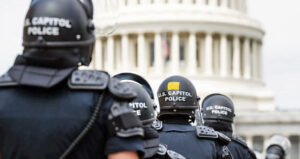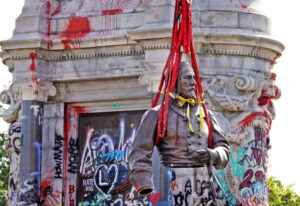American politics today presents something of a paradox. Levels of ideological polarisation have reached a height not seen since the eve of the Civil War, seemingly overriding all other considerations. Yet personality still matters as much as ever in presidential races. The reason has to do with the strange phenomenon we call charisma. To understand its power, it helps to look closely at how it operates, and also to consider the current political fortunes of two distinctly uncharismatic American politicians: Joe Biden and Ron DeSantis.
The word charisma is ubiquitous today. Marketers use it to sell everything from shampoo to perfume to olive oil. But it arrived relatively recently into common usage. Back in the Fifties, my father, then a journalist at Fortune magazine in New York, used it in a profile of the labour leader John L. Lewis. His editor sent a draft back to him with the word circled, and the comment: “What the hell does this mean?”
My father had taken the word from the great German social theorist Max Weber, who, in the early 20th century, adapted it to describe a form of disruptive authority based on an intense, emotional connection between leaders and followers (its original, much older meaning was theological: a gift of divine grace). For decades afterwards, charisma remained a technical concept in the social sciences. But in the Fifties, writers such as my father found it useful in analysing an American political scene increasingly dominated by television and other mass media. John F. Kennedy seemed to embody the quality better than anyone, and ever since his election in 1960, journalists have routinely counted charisma as a key component of presidential politics.
In their usage, charisma is a purely personal quality: you either have it, or you don’t. Weber, however, offered a more subtle and persuasive interpretation. As he pointed out, it is not enough for leaders to have unusual talents and a magnetic personality. The followers need to perceive them as doing so. Charisma, in other words, lies at least partly in the eye of the beholder. In extreme cases, such as in totalitarian societies, charisma can effectively be manufactured. Thanks to pervasive, unrelenting propaganda that presented the secretive mass murderer Joseph Stalin as a heroic superman, a large proportion of the Soviet population saw him as intensely charismatic. Many North Koreans today probably feel the same about Kim Jong Un.
Recent American history also illustrates Weber’s point. Most American liberals saw Barack Obama as intensely charismatic. He exuded energy and hope, and was a brilliant, incantatory speaker. But his magnetic appeal was entirely lost on most Republicans, who dismissed him as a phoney huckster, and mocked his reputation among liberals by calling him their messiah. Donald Trump, by contrast, both horrified and disgusted most liberals, but has appeared as a quintessential American hero to his supporters, and almost God-like to the most fervent of them. To the Republican base, he remains the very embodiment of charisma.
Still, in free societies without Stalinist-level propaganda, charisma can’t simply be manufactured, and personal qualities remain crucial. Kennedy wouldn’t have been perceived as charismatic without his youthful vigour, his easy, sexy manner, his brilliant smile, and his ability to give an enthralling speech. Obama has genuinely extraordinary oratorical powers. And Trump, whatever one thinks of him, is an enormously talented entertainer, and has an uncanny ability to sense and express his supporters’ most visceral feelings. He has a neural connection to the Republican id.
Charisma hasn’t always been this partisan. In fact, as I argued in a recent book, it has often played an important, positive, unifying role in democratic societies. Charismatic leaders have inspired trust even among their political opponents, thereby helping to bring fractured nations together. By the power of their oratory, they have broken through political logjams and brought about needed action. They have put warm flesh on the bones of abstract constitutional principle. At the start of the democratic age, figures such as George Washington in the United States, Toussaint Louverture in Haiti and Simón Bolívar in South American all exemplified these uses of charisma, even if the fervour they inspired in their followers also tempted the last two towards dictatorship. In the United States, Abraham Lincoln, Franklin Roosevelt and Kennedy, while each the target of fierce criticism, also exerted a charismatic appeal that went well beyond their own political camp, as illustrated by the nation-wide outbursts of grief that followed their deaths.
But for charisma to have these positive, unifying effects, ordinary people need to at least be open to the possibility of seeing figures from the other camp as charismatic. The record of the Obama and Trump presidencies suggest that America is now far too divided for this recognition to take place. And as a result, charisma has lost much of its positive role in the United States. No matter how brilliant the personal qualities, they only work on followers already ideologically disposed towards the candidate in question.
The rise of virulently partisan radio and television, of social media, and of internet algorithms have all exacerbated the problem enormously. Thanks to my own browsing history, literally every time I open a new tab, Microsoft shows me a news story about the awfulness of Trump. A conservative cousin gets the same horror stories, but about Joe Biden. The same forces make it all the easier for ordinary people across the world to feel a charismatic bond with populist politicians like Trump, or Narendra Modi, or Viktor Orbán, who appeal directly to the emotions. By contrast, technocrats like Emmanuel Macron, who last week sternly scolded French families for not raising their children with sufficient “authority”, are all the easier to mock as elite and out of touch.
All this brings us to the current presidential campaign, and the figures of Joe Biden and Ron DeSantis. Biden, whatever one thinks of him, has been a significant president with some important achievements to his name. He succeeded in passing a massive infrastructure bill and an “Inflation Reduction Act” which will allocate unprecedented sums to fight climate change. He strengthened the Western alliance in the face of Russian aggression and cannily resolved the debt ceiling crisis. During his administration, unemployment has hit a 50-year low, and inflation is returning to normal levels after the pandemic.
But Biden gets very little credit for these achievements, even from people who voted for him. Barely 40% of the American population approves of his record as president, while more than 54% disapprove. To be sure, conservative Republicans loathe him, seeing him as corrupt and disruptive. But their opposition alone cannot explain these dire numbers. A better clue comes from a recent column by Pamela Paul of The New York Times, who lamented the prospect of a Trump-Biden rematch in 2024. Surely, she moaned, we can do better than these two visibly declining old men. She first damned Biden with weak praise, allowing that he has restored norms and “been decent”, but then went on to damn him, full stop: “That old age is showing. Never an incantatory speaker or a sparkling wit, Biden seems to have altogether thrown in the oratorical towel.” In other words, she ignored Biden’s actual record as president, and focused on his charisma, or rather his lack of it.
Lack it he does. On video, Joe Biden unquestionably cuts a poor figure. He looks his age. He moves haltingly. His speech stumbles, stammers and wanders. It is all too easy to portray him as senile. Yet the same conservative critics who call him a senile puppet will often, in the very next breath, denounce him as a criminal mastermind. Both can’t be true, and in fact Biden’s record as president very much belies the charges of senility. As president, he has made no memorable speeches, to say nothing of incantatory ones. Instead, he has effectively applied skills he perfected in his long career in the Senate: glad-handing, making deals and crafting coalitions behind the scenes. But in the eyes of journalists like Paul, these skills, and what Biden accomplished with them, matter less than his glaring lack of charisma.
On the other side of the political abyss, DeSantis’s campaign for the Republican presidential nomination illustrates equally well the way Americans continue to over-emphasise charisma. Nine months ago, after winning re-election as governor of Florida by nearly 20%, DeSantis looked poised to replace Trump as the Republican Party’s darling. He was “Trump without the chaos”, “Trump without the baggage”, “Trump without the nonsense”. At 44, he had vigour, obvious intelligence and a record of challenging and provoking liberals at every turn. In February, a conservative columnist anointed him the Republican Kennedy. Whatever one thought of his actual policies (I, for one, thought him a menace), he seemed an obvious frontrunner for the Republican nomination.
Unfortunately, he also turned out to be “Trump without the charisma”. As the campaign began, it became painfully obvious that he lacked Trump’s easy rapport with crowds, his neural connection to them. In public, indeed, DeSantis appears incapable of relaxing. His voice vibrates with tension. He has no visible sense of humour. Charisma, as Weber emphasised, requires the ability to establish an emotional connection with followers, and DeSantis seems, at crucial moments, either to shrink away from them, or to laugh maniacally in an awkward attempt to bond. It should not be surprising, then, that DeSantis currently lags Trump by more than 30% in most polls, and just this week has cut more than a third of his campaign staff. Barring an unexpected turn of events, he might well end up withdrawing from the race before a single primary vote is cast.
Is it possible, in our current moment, to imagine a figure whose charismatic appeal might help unite the country instead of further dividing it? It is not implausible that our political divisions will get even worse, leading to government paralysis, violence, and a crisis severe enough to shake Americans out of their ideological certainties. In that case, they might well flock to a charismatic figure promising to restore unity. But would that figure respect democratic, constitutional norms? The historical record is not encouraging. In one of the most prominent cases, the bitter partisan divisions of the French Revolution opened the door for Napoleon Bonaparte, who ruled as a dictator while sacrificing millions to his wars.
But meanwhile, in the short term, the most likely upshot of America’s continuing obsession with charisma is that it will help Donald Trump back into power 15 months from now. That alone is an excellent argument for not putting too much emphasis on it.
Disclaimer
Some of the posts we share are controversial and we do not necessarily agree with them in the whole extend. Sometimes we agree with the content or part of it but we do not agree with the narration or language. Nevertheless we find them somehow interesting, valuable and/or informative or we share them, because we strongly believe in freedom of speech, free press and journalism. We strongly encourage you to have a critical approach to all the content, do your own research and analysis to build your own opinion.
We would be glad to have your feedback.
Source: UnHerd Read the original article here: https://unherd.com/





